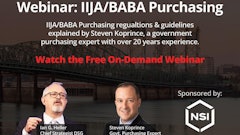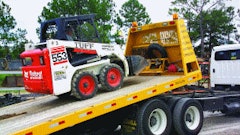There is little question that managers and owners of property have a much better understanding of - or at least a greater interest in - pavement than they used to. Owners and property managers for a long time didn't see the value in patching, cracksealing, or sealcoating, unless the value was to prevent litigation or simply make the pavement look better.
Rare was the property manager who looked at her pavement as an investment that needed to be protected, and the reason for that is likely economic. Parking lot pavement was treated almost as a disposable item: When it got too bad the owners would just tear it out and build a new parking lot. Years ago when labor and material costs were low that might have been a short-sighted approach, but from an economic standpoint it was sound. Why spend money all along when it was just as cheap to rebuild it later? (Roads were treated the same way.) But as costs of oil, aggregate, fuel, and labor have skyrocketed over the years property managers have sought ways to protect their pavement investment, and pavement maintenance has turned out to be the best approach.
Today, property managers want to know what maintenance options are available and how pavement can be made to last longer. There also is a greater understanding of life-cycle costing, and there's a recognition that the right maintenance procedure done properly at the right time can help extend the usable life of the pavement. This is partly the result of contractors working to educate their customers, both as a way to differentiate themselves from the competition and as a way to justify the services and costs associated with them.
But Jeff Stokes, Next Level Contractor System, cautions that while the customer is concerned about the technical aspect of the product or service, they are equally concerned about the "experience" and "return on investment" they can expect. "Details such as long-term maintenance budgets, project communication, traffic control, notification, and production plans are critical," Stokes says. "Smart contractors are covering these factors as part of their sales approach and lunch and learn presentations."
More Centralized Buying
In the not-too-distant past commercial companies with multiple locations across the country allowed the local manager to make buying decisions concerning her own business and property. Increasingly (and this has accelerated in recent years) many national companies are working to centralize as many buying decisions as possible, imposing greater control and theoretically reducing costs. In more and more instances companies such as a hotel chain, a fast food chain, or "big box" chain are putting buying decisions in the hands of fewer individuals (and in some instances relying on a pavement consultant as a go-between).
The impact is that in more and more instances the contractor no longer can rely on the relationship with the local operator or manager, and a more-complex bid now must be closer to the bone than ever as decisions are made by a regional or national buyer. Price is always a factor, but the relationship with local contractors is less important. New factors that come into play include the ability of the contractor to service multiple properties over a large multi-state or national area in an efficient manner while providing quality work in a timely manner. The ability to provide a range of services also has become important.
Contractor "Branding"
This national approach to buying pavement maintenance services has encouraged contractors to "brand" themselves, to pay closer attention to developing an image, and to spending marketing dollars to differentiate themselves from their competition. Some do it on their own, ("Al's Asphalt Maintenance") and some affiliate themselves with an outside firm such as Black Dog, 1-800-Asphalt, or 1-800-Pavement.
It also enables organizations such as Pavement Network, which has contractor members handling accounts throughout the country, and Rose Paving, which offers similar national service but in a less formal approach, to offer nationwide services to multi-property customers.
But as property owners and managers seek to simplify their complex work managing multiple properties across broad areas, a new type of service company has entered the industry. Termed National Service Providers (NSP), these companies provide virtually any array of services a property manager might need, from HVAC to plumbing and parking lot maintenance. These NSPs provide this service through a stable of contractors under contract. The NSP contracts with a company that owns or manages properties, then finds contractors among its members to perform the work.
From the contractor's standpoint, especially for the contractor who is smaller or who is less inclined to brand or otherwise market his company, the NSPs provide access to work the contractor might otherwise be unable to get. The NSP becomes a sales arm of the contractor, securing the job while the contractor does the work, receiving an agreed-upon fee.
In some instances there have been complaints of NSPs, and the system is often criticized for low-ball pricing, lack of attention to quality on the job, and slow payment to contractors. But that is not necessarily the case in all NSP/contractor relationships, and in certain markets the use of NSPs has provided work and cash flow for contractors who otherwise might not have gotten it.
Seeking More Than Price
Inevitably in these situations price plays an important role. National companies are centralizing their buying decisions partly to streamline their own operations (and better control their own costs) but also because they figure they can get a better price by providing access to work on properties throughout a state, region, or even the entire country.
But these national companies also are looking for service, quality, responsiveness, reliability, and ease of operation. By working with one contractor (or perhaps several) across the country these centralized buyers reduce the number of bidders, and simplify their work.
So the contractor who can service multiple properties and offer a variety of services for those properties offers an added value - and the sales volume resulting from dozens or more properties nationwide might make it reasonable for the bidding contractor to seek a little less per job. In many cases this has turned into a win-win situation for the bidding contractor and his national account.
Stokes says these and other types of contractor networks are valuable if they can produce a consistent, positive experience for the customer. "That's what quality chains do -promise quality and consistency, then back it up with a guarantee; think Hampton Inn. They also can encourage best practices and make everyone better," Stokes says. "Having said that, consumers are not as loyal to a network by itself. The network has to provide value.
"Contractors that provide service on a nationwide basis are both needed and vulnerable," Stokes says. "Companies continue to 'right size,' meaning property managers have less time to consult with multiple partners. Many are comfortable dealing with national providers and/or general contractors who can meet all their needs, even if that convenience comes at a premium. But for all their positives, these providers can be vulnerable in that smaller firms who make their way into larger chains on a regional basis can be perceived as the better value choice especially when 'Buy Local' is important."
Contractor Diversification
This approach to nationalizing services has inevitably led contractors to diversify their services. It does a centralized buyer little good as he seeks to streamline pavement maintenance for 30 properties in New Mexico if he still has to work with a sealcoating specialist, a paving specialist, and a pavement marking specialist. True, it does cut down on the number of contracts overall (if, for example, each of those 30 properties was working with specialists for each service), but the real advantage to a property manager buyer is if he can find a contractor who handles all those pavement maintenance services - and maybe a few more.
And this applies on the local level as well. Don't mistake the rush to contractors servicing national accounts to mean that there's no more local business. Quite the contrary. That's one area that likely hasn't changed that much from 25 years ago. Contractors who want to work locally, and only locally, can find more than enough pavement out there to keep them busy and make them profitable.
But even local property owners and property managers would prefer dealing with a one-stop contractor who can solve all or at least many of their pavement needs. So contractors have figured out a variety of ways to meet that demand. Many have diversified, adding support services to their main pavement maintenance service. The low cost of adding sealcoating, striping, cracksealing, and even pavement repair to a business makes expansion a relatively risk-free proposition.
Another approach is to affiliate with other contractors who provide services you don't. Each can essentially market the services of the other contractor, becoming the one-stop shop for the customer, without taking on any additional risk. This subcontracting approach has been going on for years and seems to have accelerated, at least informally, in recent years.


























